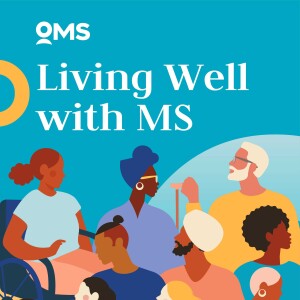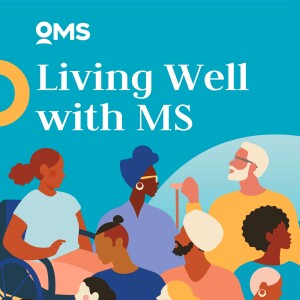
Living Well with Multiple Sclerosis
Health & Fitness:Fitness

10 minutes with George: Learnings after following the program for years and the future | S4E29
 2022-10-19
2022-10-19
Welcome to Living Well with MS. We are pleased to welcome Professor George Jelinek as part of a short series, '10 minutes with George’. These special episodes with the creator of the Overcoming MS Program mark the 10th anniversary of our charity, Overcoming MS.
In this final episode, George explains his learnings after many years on the program and his hopes for the future. You can also watch it here.
Keep reading for the key episode takeaways and Professor Jelinek’s bio.
Make sure you sign up to our newsletter to hear our latest tips and news about living a full and happy life with MS. And if you’re new to Overcoming MS, visit our introductory page to find out more about how we support people with MS
This is the fifth instalment of a five-part series. Listen to parts one, two, three and four.
Bio:
Professor George Jelinek developed the Overcoming MS Program and founded the Neuroepidemiology Unit at the University of Melbourne's School of Population and Global Health which continues to research its benefits.
George’s Story
When George was diagnosed with MS in 1999, he was determined to do something. His mother had died as a consequence of her MS, which spurred him on to sort through the medical literature on MS. His career as a Professor in Emergency Medicine and his background as Editor-in-Chief of a major medical journal gave him the tools to do this.
It became clear to George that remaining well after a diagnosis of MS is more than just a possibility. He found that with commitment to the right lifestyle changes, there is the real probability that many people with MS can live long, healthy lives, relatively free of the usual problems associated with the illness. These lifestyle recommendations are now referred to as the Overcoming Multiple Sclerosis (OMS) Program, which he detailed in his book Overcoming Multiple Sclerosis.
George has remained free of further relapses, as have many people who follow the OMS Program.
Selected Key Takeaways:
The Overcoming MS Program can improve your mental health, even if you don’t physically get better.
(4:25) “Some of the best things I've seen have been in people who didn't physically get better. A good example is someone who came to the program very early on when I first started running the retreats, who was using a wheelchair and had had MS for 25 years and was very disabled and was very depressed…. I saw her again, some months and then years later, and she was still using a wheelchair to get around and she still clearly was very disabled. But for me, there was this sort of radiance coming from her…. And I thought, now there's an outcome worth celebrating, even though it doesn't quite fit into some of the preconceived ideas we might have about overcoming [MS] or recovering.”
As evidence accumulates, the program evolves. Cryotherapy is one potential example.
(10:36) “There's stuff in the literature now about cryotherapy – about regular exposure to cold – and some people have already adopted that. But these things are in their infancy, really, and we aren't at the point where I think it's sensible to adopt it as a mainstream recommendation in the program. But like all evidence-based programs, as the evidence keeps accumulating, the program will keep evolving, and that's how it should be.”
The key elements in the OMS Program involve modifying the factors which cause the illness to progress.
(12:24) “There's no guarantee, but if you can modify the risks, (and there's a good science on which factors cause the illness to progress)... then you give yourself every chance of having the best possible outcome. And these are generally diet, exercise, stress, sunlight and vitamin D. They're really the key planks [of the Overcoming MS Program].”
Related Links:
- Overview of the OMS program
Don’t miss out:
Subscribe to this podcast and never miss an episode. You can catch any episode of Living Well with MS here or on your favourite podcast listening app. If you enjoy Living Well with MS, please leave a 5-star review on Apple Podcasts or wherever you tune into the show. Feel free to share your comments and suggestions for future guests and episode topics by emailing podcast@overcomingms.org.
If you enjoy this podcast and want to support the ongoing work of Overcoming MS, you can leave a donation here.
More Episodes
 2024-10-02
2024-10-02
 1.1k
1.1k
 2024-07-24
2024-07-24
 136
136
 2024-05-29
2024-05-29
 81
81
 2024-05-01
2024-05-01
 112
112
 2024-02-07
2024-02-07
 62
62
Create your
podcast in
minutes
- Full-featured podcast site
- Unlimited storage and bandwidth
- Comprehensive podcast stats
- Distribute to Apple Podcasts, Spotify, and more
- Make money with your podcast
It is Free
- Privacy Policy
- Cookie Policy
- Terms of Use
- Consent Preferences
- Copyright © 2015-2024 Podbean.com




